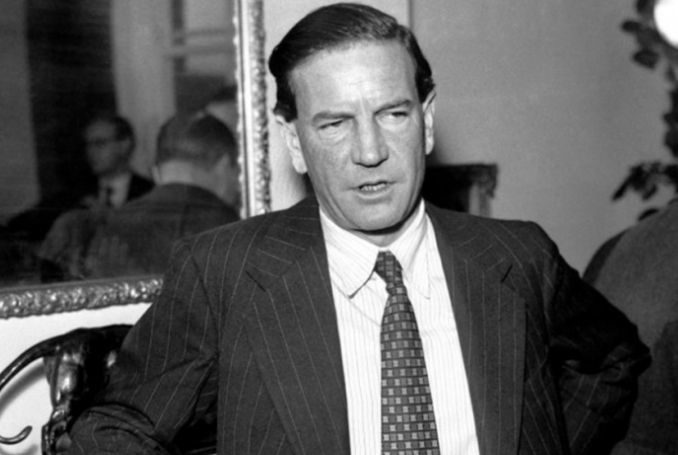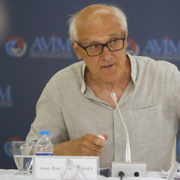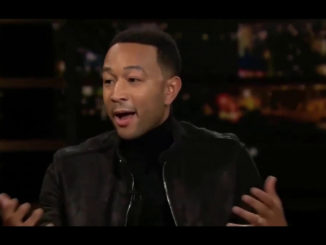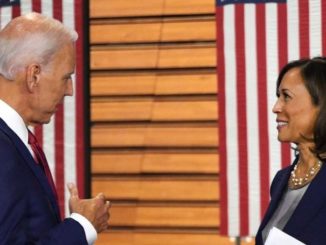
By Jeremy Salt
This reading of history is substantially but not wholly based on Elizabeth Monroe’s book Philby of Arabia (London: Quartet Books, 1973). With the exception of Kim Philby’s references to his wife, his father, and his once best friend, Nicholas Elliott, all the quoted material is taken from the book.
The young generation may never have heard of Kim Philby, so a few words by way of introduction are necessary. Philby was at Cambridge University in 1934 when he was recruited as a Soviet agent. He went to Spain to report the civil war before being recruited by M16 in 1940, rising to senior positions, including control of the Soviet desk, even as he handed Britain’s secrets to his Soviet controller. By 1949 he was head of intelligence at the British embassy in Washington, which, through his close friendship with James Jesus Angleton, the head of the CIA’s special operations section, gave him insights into American secrets as well, and perhaps the secrets themselves.
In 1951, Guy Burgess and Donald McLean, both friends of Philby and his colleagues in the British intelligence community in the US, and both Soviet agents, defected. Philby also came under suspicion and was compelled to resign, before being cleared of any wrongdoing by Prime Minister Harold MacMillan in 1955.
In 1956 Philby moved to Beirut as a correspondent for the London Observer. A Soviet defector having pointed the finger at him again, MI6 sent another old friend and colleague, Nicholas Elliott, to Lebanon in 1963 to question him. They had one meeting, during which Philby verbally confessed but refused to put anything down in writing. Before their planned second meeting, Philby made his way at night to the docks where a Soviet freighter took him to Odessa. Honored by the Soviet government, he lived in Moscow until his death in 1988.
Philby is ranked as the most successful of all cold war agents. The information he passed on led to the death of hundreds of people, including armed men sent into Albania to overthrow the Stalinist government of Enver Hoxha and a defector who tipped off the British consulate in Istanbul. Soviet agents got to him and once back in Moscow, he and his family disappeared forever.
Philby expressed no regret for any of this, on the basis that these victims of the spy game knew, like him, what they were letting themselves in for. He even provided information to the Soviet Union on his wife Aileen (“bourgeois and philistine”), his old friend Nicholas Elliott (“ugly and rather pig-like”) and even on his father, Harold St John Philby, which is where the central point of this article begins.
If Philby made his way into the intelligence community and then journalism with such ease it was because he was ‘one of us,’ the privileged elite which ran Britain. His father was also ‘one of us,’ even if generally out of tune with what his government was doing. Whereas Kim concealed who he really was, Harold spoke openly, critically and often angrily, irrespective of the effect on his listeners. He would never have been a good choice for the intelligence community, but he did serve the government after 1918, holding down numerous positions in Iraq, Transjordan (as it then was) and Saudi Arabia.
If he irritated senior figures wherever he went he was always respected for his knowledge, his explorations and his close and useful personal connection with the Saudi monarch, Abd al Aziz ibn Saud.
Even when serving the government Philby used his spare time to explore Arabia. He crossed the fearsome desert expanse known as the ‘empty quarter (ruba’ al khali), he looked for (and found) evidence of ancient cities and culture. He also amassed collections of rare specimens of butterflies and birdlife, many ending up in British museums.
Privately, Philby ran two families, one in England and one in Riyadh. At the age of 60, having become a Muslim, he accepted the ‘gift’ of a girl of 16 from the Saudi king and went on to have several children with her. He was still running his other home and wife, Dora, in England, seeing her only when he visited or she visited him. As illegal and as abhorrent as it would be in England for a man of Philby’s age to take as a wife a girl of 16, it was probably unremarkable in Saudi culture.
His Cambridge background, his butterfly and bird collecting and his life-long love of cricket established Philby as a conventional upper-middle-class Englishman but there was this other maverick side, often intemperate and deeply critical of imperialism, in particular Britain’s policies in the Middle East, establishing him as another kind of conventional Englishman, strongly individual and eccentric by the standards of others. The two sides lived somewhat awkwardly with each other throughout his life.
Philby was immediately hostile to the post-1918 mandates system, which he regarded as a “fig leaf” for French and British imperialism. In Iraq and Syria, it was clear to him that both Britain and France had betrayed their promises of national governments to be established on the basis of the free choice of the indigenous people. The exception in this stream of thinking was Palestine.
Charged with going to the Hijaz to smooth over differences with the Sharif Husain of Mecca – now self-proclaimed king of the Hijaz as well – over British policy on Palestine and the rising power of Abdul Aziz ibn Saud, Philby got somewhere on the first issue, Husain seeming to understand “that the British wished to settle some Jews in Palestine,” but he was immovable on the second. Abdul Aziz ibn Saud was preparing to pounce on the Hijaz, driving Husain and his family into exile, and forbade Philby from making a side trip to the Saudi kingdom in Najd (central Arabia) before returning to Cairo.
On Palestine, Philby was inconsistent. If the Iraqi and Syrian people were to be given the right to their own government through the free choice of their people, why not the people of Palestine? From official quarters the answer was clear if usually muffled: because we intend to give Palestine to zionist settlers and until they reach a majority, independence has to be withheld.
In Britain Philby sat on a League of Nations Union committee alongside academics, politicians, and zionists charged with coming up with a model mandate for Palestine. Although the British government and the Zionist movement knew what they wanted in Palestine, a Jewish state at the expense of the Palestinians (as Balfour had made clear in public statements), the Zionist intention from the start to get rid of the Palestinians through ‘transfer’ was concealed by the zionists and bypassed as a subject for polite conversation by the British government.
Far from speaking against the zionist colonization of Palestine, Philby and T.E. Lawrence, forever linked in British minds with the struggle for Arab independence, believed, as Elizabeth Monroe has written, that “an injection of Jewish brains and money into the Arab world would improve Arab chances of successful independence.”
Thus swayed by zionist thinking, Philby was supported by Chaim Weizmann, whom he later took tea with in London, when he applied for a position in Palestine, only to be turned down because of advice to the High Commissioner that he was argumentative and would prove to be a nuisance.
Philby’s views on Palestine were nothing if not inconsistent with each other and with his general support for Arab independence. He regarded the Balfour Declaration as “an act of betrayal for whose parallel, the shekels and the kiss and all the rest of it, we have to go back to the Garden of Gethsemane.”
At the same time, he thought British governments should reaffirm the declaration because Jews had a “perfect right” to settle in Palestine on “a basis of equality with the existing population.” Transjordan, he thought, would only be too happy to accept Jewish investment and immigration into a territory that should never have been separated in the first place. He never budged from his belief that the Jews had it in them to benefit the Arab world as long as – the critical qualification – they dropped any wish to dominate. Of course, Weizmann and others in the Zionist leadership gave endless assurances that this was the last thing they had in mind.
Philby frequently tried to bring Abdul Aziz Ibn Saud around to his way of thinking on Palestine. The king shared the general Arab view that to take land from the indigenous population of Palestine and give it to Zionist settlers was unjust. He opposed partition when it was proposed in 1937 (the Peel plan) and said that even if all other Arab states recognized a Jewish state he never would, a statement of contemporary relevance given the recognition of Israel by the UAE and Bahrain and Saudi Arabia’s scarcely concealed dealings with Israel.
In 1939 Philby showed how poorly he understood Abdul Aziz ibn Saud on the question of Palestine. During a meeting in London with Professor Lewis Namier, Jewish, and a zionist, he said the king would come on board with British policies in the Middle East (as against the growing influence of Germany and Italy) if he were given money and weapons.
Namier suggested a meeting with Weizmann to see what might be arranged. When Namier, Philby and Moshe Shertok (later Sharett), political secretary of the Jewish Agency, met Weizmann on October 8, Philby proposed that if the zionists could come up with a 20 million pound ‘subsidy’ for the king, they could be given western Palestine, with the exception of the ‘Vatican City’ in east Jerusalem. At the same time, they should commit themselves to help secure Arab unity and independence (outside Palestine of course), which in Philby’s view was only attainable under Abdul Aziz’s leadership.
According to Weizmann, the conversation included references to “considerable transfers of the Arab population”: hedging his position, he said there was not much the zionists could do to advance the situation politically, apart from which they were bound by their “loyalties” to Britain and France.
Forever chasing money, Philby no doubt saw some coming to him if this scheme could be pulled off. He presented it to Abdul Aziz on January 8, 1940, when, in his own understanding, the king did not turn it down, saying only that he would give an answer at the appropriate time. In truth, the king was probably taken by surprise and did not like what he was hearing. Philby misconstrued silence as consent, wrote to his wife about the king agreeing and was sufficiently indiscreet to mention it to Syrians in the king’s entourage.
In February 1940, Weizmann contacted him from Washington to see how things we going. “Slowly,” Philby had to respond, while remaining confident that the king was “quite favorably inclined towards the proposal and is just thinking about how it can be worked out without producing howls of anger among certain Arab elements.” While Weizmann worked on the Americans, the plan would have to wait for the king to work out how to overcome Arab objections.
In 1940 and 1942 Weizmann saw President Roosevelt and, in the second of these years, Churchill as well. In Weizmann’s account, Churchill talked of wanting to make Abdul Aziz the “boss of bosses” in the Middle East “provided he settles with you.” This was an opportunity for Weizmann to try and dovetail the Zionist-Philby plan with what the Americans and British were both thinking.
In August 1942, Roosevelt sent Colonel Harold B. Hoskins to the Middle East as the head of a mission to engender goodwill. At a time the Middle East was unanimously hostile to the zionist presence in Palestine, not much goodwill was going to be generated by the plan which came out of the Hoskins mission, which was to admit 500,000 Jews into Palestine and set up a binational state as part of a Levant Federation that would include all of historic Syria.
In 1943 Roosevelt sent a message to the Saudi king that both “Arabs and Jews” would be consulted over the future of Palestine. In August Hoskins was sent to Saudi Arabia to see if the king would agree to meet Weizmann. When he made the suggestion the king blew up. In Elizabeth Monroe’s summary of the occasion, “he hated Weizmann personally because the latter had impugned his character by offering a bribe of 20 million pounds if he would accept Arab settlers from Palestine.”
Furthermore, the king had been told the payment would be guaranteed by Roosevelt, which was certainly due to Weizmann’s campaigning. The king was so incensed at the offer and the involvement of the US president “in such a shameful manner” that he never brought it up again in his discussions with Hoskins. Hoskins went to London, where he “disabused” Weizmann and Namier of the idea that Philby’s views represented the Saudi king’s. Philby persisted in believing that if Hoskins had approached the king with a firm offer on behalf of the US and British governments it would have been accepted. Of course, with oil being drilled in commercial quantities since 1938, the money on offer would soon be eclipsed by the vast sums flowing into the kingdom.
With partition passed by the UN General Assembly and the situation in Palestine worsening, the king could not bring himself to listen to the radio. Tears would come to his eyes. He agreed to meet members of an Anglo-American Commission bent on linking “Jewish victims of Nazi persecution everywhere” to the zionist colonization of Palestine. The king distrusted Philby when it came to Palestine so he was not at the meeting, at which Abdul Aziz told his visitors that “if the immigration of Jews continues and their possessions in Palestine increase, they will become one of the most powerful governments, equipped with arms and wealth and everything else. They will be against the Arabs and at the same time [will be] difficult for them.”
With the British leaving Palestine, he said a continued British mandate would be better than a triumph for the Jews or an enlarged kingdom for King Abdullah of Jordan, then conspiring with the Zionist leadership.
With the Arab states under foreign domination, and the Arab League newly formed and ineffectual, Philby came to admire “the courage and fanaticism of the Jews as much as I deplore the futility of the Arabs.” It was no wonder that many in Saudi court circles regarded him as a zionist spy, a British intelligence agent or a communist. As Philby’s son Kim was a committed communist and at the time was handing secrets from inside MI6 to the Soviet Union, there was certainly irony in their suspicions.
Philby needed to be in Saudi Arabia for further desert explorations and to make money from his various commercial ventures. He must have known that if he pushed the king any further on the question of Palestine he would he putting his own interests at risk. He continued to argue for the right of the Arabs to run their own affairs, all the Arabs, that is, except the Palestinians.
– Jeremy Salt taught at the University of Melbourne, at Bosporus University in Istanbul and Bilkent University in Ankara for many years, specializing in the modern history of the Middle East. Among his recent publications is his 2008 book, The Unmaking of the Middle East. A History of Western Disorder in Arab Lands (University of California Press). He contributed this article to The Palestine Chronicle.

– Jeremy Salt taught at the University of Melbourne, at Bosporus University in Istanbul and Bilkent University in Ankara for many years, specializing in the modern history of the Middle East. Among his recent publications is his 2008 book, The Unmaking of the Middle East. A History of Western Disorder in Arab Lands (University of California Press) and The Last Ottoman Wars. The Human Cost 1877-1923 (University of Utah Press, 2019). He contributed this article to The Palestine Chronicle.








Jeremy Salt missed St John (not ‘Harold’) Philby’s main intervention on the side of the Palestinians, which happened in October 1929, soon after the August 1929 riots. He worked with Syrian leaders and the key Palestinians (South Syrian) Awni Abdul Hadi and Jamal al-Husseini on a compromise with Britain which would have set up a representative government in Palestine, for the time being still under a High Commissioner with veto powers. As Salt writes, St John Philby had from the start believed Britain and France should uphold their Anglo-French Declaration of 9 November 1918 guaranteeing independence in all of Greater Syria.
Blake is right – my mistake. Philby the father’s full name was harry (not Harold) bridger st. john Philby, generally known later in life as ‘jack’ or because of his lifelong middle east connection ‘Shaikh Abdullah.’ whatever the level of Philby’s 1929 intervention on the question of Palestine, he very soon afterwards was adopting a position consistent with Zionist interests.